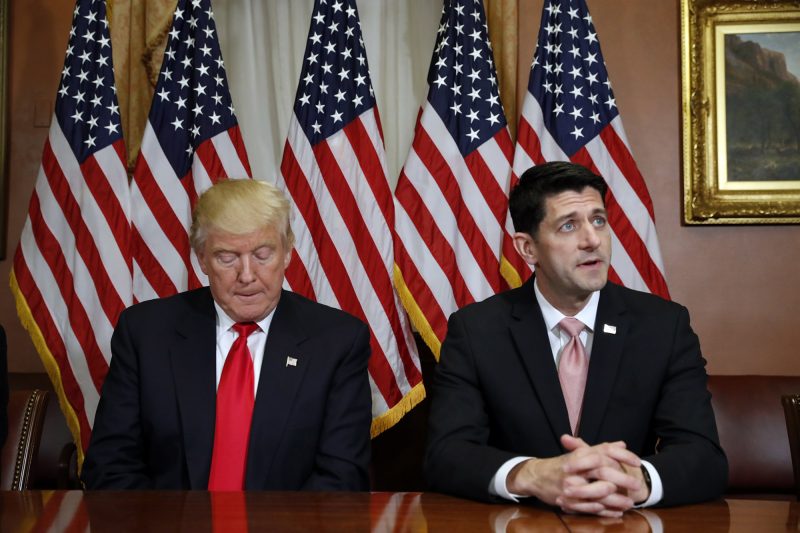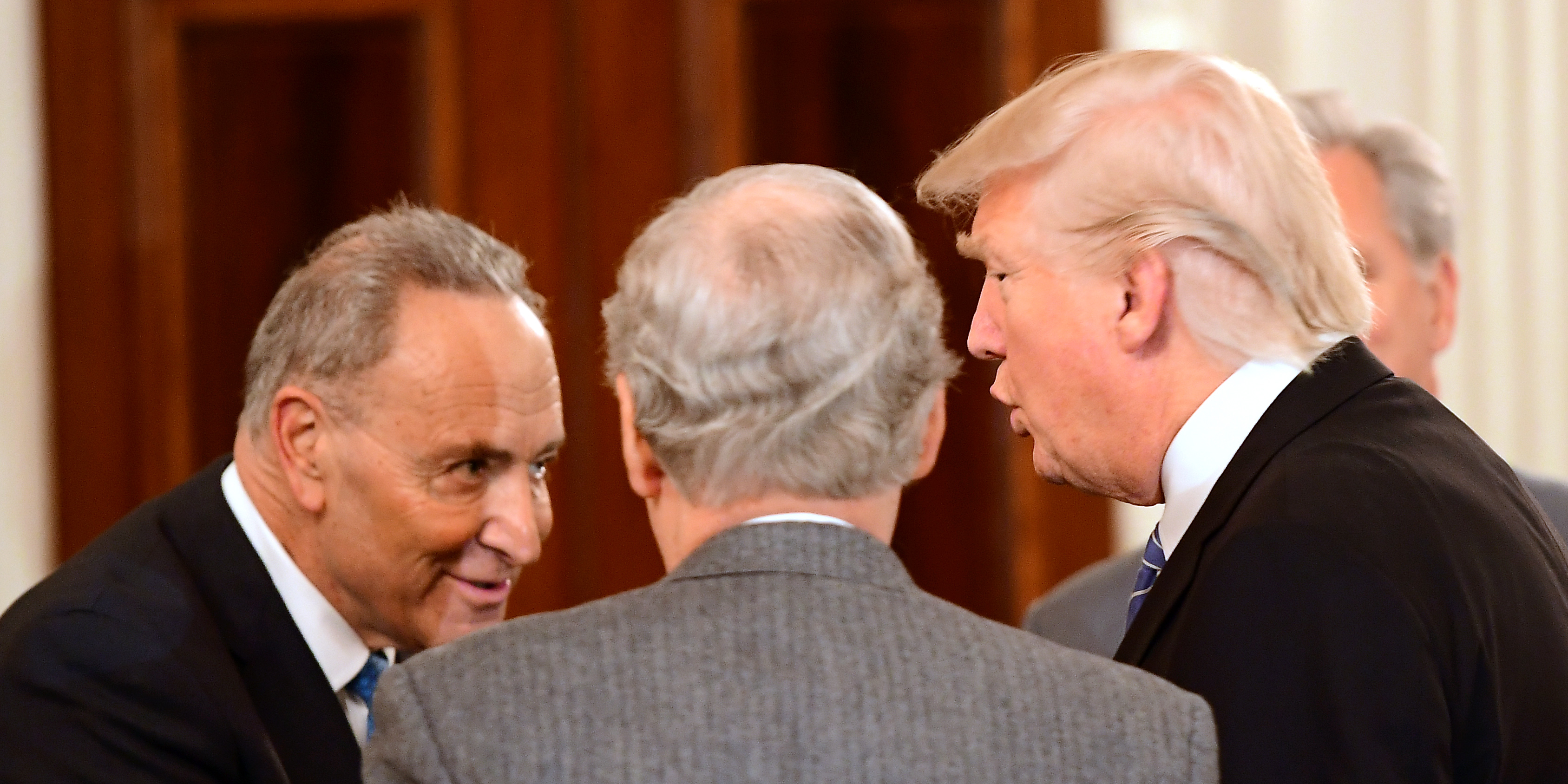- The federal government has entered into a third day of a partial shutdown after the Senate failed to break an impasse on Sunday.
- Democrats continue to ask for a commitment for the GOP to consider immigration, healthcare, and spending policies, while Republicans are holding firm on their original offer.
- The Senate will take a key procedural vote about noon that could end the shutdown if it passes.
The federal government headed Monday into a third day of a partial government shutdown with little apparent progress toward a deal over the weekend.
Senate Majority Leader Mitch McConnell attempted Sunday afternoon to break the impasse with a motion to pass a short-term funding deal, but it was blocked by Senate Minority Leader Chuck Schumer. Schumer said the two sides “have yet to reach an agreement” on a bill to open the government.
The Senate will take a key procedural vote Monday at noon on a bill that would keep the government funded for three weeks, It is uncertain whether that vote will succeed. Sen. Joe Manchin, a moderate Democrat who is part of a group of bipartisan senators working on a deal, said the Senate remained at a “stalemate” on Monday morning.
White House Director of Legislative Affairs Marc Short told Fox Business that he was “not sure the Senate will have the 60 votes it needs today” to pass a funding bill at noon.
At the same time, roughly 800,000 federal employees woke up Monday locked out of their jobs and unsure of when their next paychecks will come.
The announcement of no deal on Sunday capped a day full of negotiations, as a bipartisan group of senators attempted to hash out a deal and get their respective parties' leaders on board. In the end, no breakthrough was reached.
Sen. Lindsey Graham, a Republican from South Carolina who was one of the main behind-the-scenes negotiators, said Democrats needed to "get to yes."
McConnell "has given me a way to yes," Graham said. "And I would argue I care as much about getting immigration resolved as anyone in the body."
Democrats are fighting to pass a short-term funding extension, combined with assurances that legislation to codify the Deferred Action for Childhood Arrivals (DACA) immigration program will be considered soon.
Sen. Sherrod Brown, an Ohio Democrat, told Business Insider that he backs a funding bill that lasts a few days to work out a deal on legislative issues.
"If McConnell would open the government tonight and let us negotiate for two or three more days, we could come to a deal," Brown said.
The back-and-forth coincided with a slew of finger pointing for the shutdown, which began at midnight as Friday turned to Saturday.
Schumer attacked President Donald Trump for allegedly backing out of a broad deal to address immigration and healthcare on Friday. Trump used Twitter to attack Schumer and Democrats for "taking the Military hostage" during the shutdown. And members of both parties lobbed insults during tense meetings in Congress.
"The Democrats are turning down services and security for citizens in favor of services and security for non-citizens. Not good!" Trump tweeted Monday morning. "Democrats have shut down our government in the interests of their far left base. They don't want to do it but are powerless!"
Republicans, particularly in the House, drew a hard line, saying they would not negotiate on DACA until the government is open. They are pushing back for a longer short-term funding bill.
An impasse

Negotiations on Saturday to break the shutdown were frigid.
According to reports, Schumer and McConnell did not speak during the day, instead relying on Graham and fellow GOP Sen. Jeff Flake - who both defied their party and voted against the funding bill on Friday - to broker a deal.
The main sticking point appears to be the length of a funding bill, which would allow the two sides to work out differences on a broader deal and possible DACA solution.
Republicans are pushing for a three-week extension, to February 8, while Democrats are seeking something even shorter to try and add more pressure to negotiations. The original continuing resolution would have pushed the next shutdown deadline to February 16.
Democrats are also pushing for some sort of commitment on DACA, the Obama-era program that protects from deportation nearly 700,000 undocumented immigrants who were brought to the US as minors. House Republicans have complicated any discussion of the issue, as any Senate bill could die in the lower chamber.
Senate Republicans have rejected the idea that there should be a commitment to vote or a vote on DACA before the government reopens.
"Turning the agenda over to Democrats who just shut down the government makes no sense to me," Sen. John Cornyn, the second-ranking Republican in the chamber, said Sunday. "It just seems like it encourages bad behavior."
House Speaker Paul Ryan and House GOP leaders refused to consider any DACA solution on Saturday, saying the focus should be exclusively on funding the government.
"Open the government back up and then we'll get back to negotiating," Ryan said on CBS' "Face the Nation."
House Majority Leader Kevin McCarthy expressed similar sentiments.
"I think it's more difficult to get any agreement on DACA in a shutdown," McCarthy told reporters.
Senate Democrats appear to be waiting for Republicans to give them a commitment for a DACA vote from House Republicans before they agree to open the government.
"It depends on whether it's part of a must-pass bill. That is my strong preference. The goal is to have the DREAMer Act passed," Democratic Sen. Richard Blumenthal told Politico on Sunday. "I have no confidence, zero, in Paul Ryan bringing that bill to the floor."
Senate Republicans say they are unable to bind House Republicans to any deal. House Republicans refuse to consider any deal that may appease Senate Democrats and say they are not part of the Senate negotiations.
Meanwhile, the White House and Trump have lobbed furious attacks at Democrats and do not appear to be actively involved in any negotiations.
